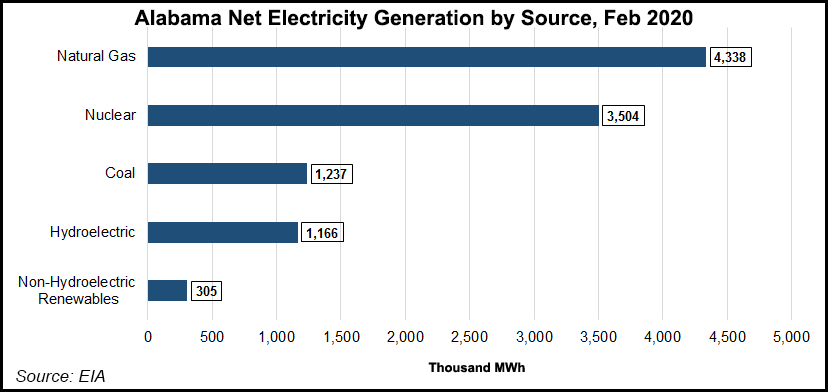NGI The Weekly Gas Market Report | Infrastructure | NGI All News Access
Alabama Power Gains Approval for 2 GW of Natural Gas Additions
Alabama Power Co.’s request to add more than 2 GW of natural gas to its energy portfolio was approved Tuesday by state regulators.

The approval by the Alabama Public Service Commission (PSC) comes less than a month after parent company Southern Company unveiled a plan to achieve net-zero greenhouse gas (GHG) emissions by 2050.
Currently, about 50% of Alabama Power’s electricity portfolio comes from coal. The natural gas additions approved by the Alabama PSC include:
● Constructing a roughly 720 MW combined-cycle facility at Plant Barry Unit 8, which is expected to be in service by the end of 2023;
● Acquiring all of the equity interests in Tenaska Alabama II Partners LP, which owns and operates a combined-cycle generation facility that produces 885 MW;
● Purchasing roughly 240 MW of combined-cycle generation under a long-term power purchase agreement expected to commence later this year; and
● Pursuing 200 MW of certain demand-side management and distributed energy resource programs.
The natural gas-fired additions to Alabama Power’s energy mix are intended to ensure the company’s 1.4 million customers have reliable power supply for upcoming winters, as there is a growing gap emerging in winter reserves.
While the electric company originally planned to add solar and energy storage to the additions, the Alabama PSC embraced the measure unanimously (3-0), and agreed to wait on approving the additions. According to the PSC, combined-cycle gas units are more adjustable in electricity output as demand rises and falls, while solar and storage are more difficult to dispatch in the winter.
Following the final order, the company said a typical residential customer’s bill would be increased by about 2%, or $4/month. However, customer bills should not be impacted until mid- to late 2023. Additionally, these changes were based on the original proposed package, which included five unapproved solar projects. Depending on the future of the solar facilities, these numbers represent an outside range.
Additionally, Alabama Power customers should see rates reduced by about 3% through 2020, according to the company, because of lower fuel costs and other expenses. For the average residential customer, this represents a reduction of $4.50/month. Customers also received a one-time bill credit in April, which totaled around $17, or about a 12% reduction in the April bill, for a residential customer using 1,000 kWh/month.
According to Alabama Power, any impact on rates from the new projects is less than the rate reductions the company is providing for customers this year. The company reported that “other factors could result in an even more favorable number as far as any impact to customers, once the projects are completed.”
© 2024 Natural Gas Intelligence. All rights reserved.
ISSN © 1532-1231 | ISSN © 2577-9877 | ISSN © 1532-1266 |
